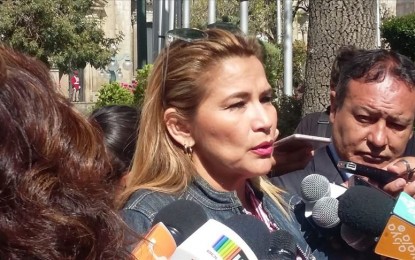
BUENOS AIRES — Bolivia on Tuesday announced its interim president, who will take the country to early elections in 90 days after long-serving leader Evo Morales resigned.
Senator Jeanine Anez, a member of the Democratic Union Party and second vice-president of the Senate, assumed control as head of state in a session of Bolivia’s Legislative Assembly.
Despite failing to garner a majority of the vote in the legislature due to a boycott by members of Morales’ Movement for Socialism party, Anez declared herself president.
Anez said the country’s laws allowed her to assume the post of interim head of state after the resignation of the president and vice-president.
She pointed out that she would do her best to ensure peace in the country and would hold general elections as soon as possible.
She is expected to take the country to early elections in 90 days.
Anez is known for her anti-Morales politics and has served for 10 years as an opposition lawmaker.
Morales’ supporters, meanwhile, continued protesting in the capital, La Paz.
‘Worst and sneakiest coup in history’
Morales issued a statement on social media on Anez’s interim presidency, calling it the “worst and sneakiest coup in history.”
“A right-wing coup-plotting senator announces herself first as president of the Senate and then as president of Bolivia without holding a legislative majority,” he said.
Morales also addressed opposition leader Carlos Mesa, a former president of Bolivia who played a major role in his resignation, and Luis Fernando Camacho, a far-right leader of the Pro-Santa Cruz Civic Committee.
“Carlos Mesa, you are destroying democracy and massacring the people. This is your legacy to history. Fernando Camacho, dividing Bolivia is not a regional honor. The Bible cannot be used to kill Bolivians. Stop ruining Bolivia,” Morales said.
Presidential polls were held in Bolivia on Oct. 20 and Morales obtained 47.8% of the vote, securing victory in the first round. But the opposition claimed there had been election fraud and some parties urged supporters to take to the streets.
After the opposition called for a canceling of the polls, Morales announced there would be new elections, but opposition supporters said they would continue protests until an election without Morales was held.
On Sunday, Bolivian Army Chief Williams Kaliman called on Morales to step down in a nationwide address broadcast live.
Morales said he resigned and a “coup” had been carried out against him. He said he made the decision to prevent Camacho and Mesa from issuing further instructions to their supporters to attack Bolivians.